

Chinese Premier Li Keqiang (2nd L, front) interacts with old friends and representatives of local people at San Shu Gong specialty shop in Malacca, Malaysia, Nov. 22, 2015. Li, accompanied by his wife Cheng Hong, visited Malacca on Sunday. (Xinhua/Li Tao)
MALACCA, Malaysia, Nov. 22 -- Chinese Premier Li Keqiang on Sunday squeezed several hours out of his tight schedule in Malaysia to visit Malacca, a port city about two hours' drive from Kuala Lumpur.
The tour, quite distinctive in an itinerary crammed with multilateral and bilateral meetings, featured a diversity of activities from visiting museums to chatting with local folks.
However, it was well beyond a regular travel to get to know the local customs and conditions. More importantly, it was an explicit gesture of China's commitment to peaceful development and common prosperity in East Asia.
China has been playing a leading role in promoting all types of regional cooperation and integration, as the premier demonstrated in the 18th ASEAN-China (10+1) leaders' meeting, the 18th ASEAN-China, Japan and South Korea (10+3) leaders' meeting, and the 10th East Asia Summit.
He pledged to offer loans totaling 10 billion U.S. dollars for ASEAN infrastructure as well as free assistance worth 3.6 billion yuan (around 563 million U.S. dollars) to underdeveloped ASEAN nations in 2016.
He also called on China and ASEAN to speed up the upgrade of their free trade area (FTA), and conclude the negotiations on the Regional Comprehensive Economic Partnership (RCEP) by 2016.
Although most of the nations in the region aspire for closer ties with China, a few countries have been hyping up "China threat" theories and wrongfully accusing China of bullying its neighbors.
Hegemony is never within China's culture and policy, as proved by ancient Chinese navigator Zheng He's great expeditionary voyages during the Ming Dynasty (1368-1644). Li reiterated the message during his stay in Malaysia.
Li made a particular stop at Zheng He Museum in Malacca, a place to commemorate the erstwhile intercontinental voyager, who is also believed to be the initiator of the ancient Maritime Silk Road.
Starting his expeditions more than eight decades earlier than Christopher Columbus, Zheng made seven sea voyages to Southeast Asia, South Asia, West Asia and East Africa from 1405 to 1433, and brought silk, tea and chinaware either as commodities or as gifts to the local people wherever he traveled.
Historical records revealed that Zheng visited Malacca for at least five times, and deepened the friendly exchanges between China and Malaysia in a significant way. Actually, he remains widely admired today for bringing nothing but friendship and prosperity to the places on the route with his big fleets.
However, maritime disputes have been simmering in recent years in the sea area where Chinese ancestors used to sail around. The United States, with its high-profile strategy of rebalance to the Asia-Pacific, is meddling in regional affairs and stoking tensions.
Prior to the meetings, U.S. President Barack Obama labeled the South China Sea as "a major topic," and U.S. National Security Advisor Susan Rice dubbed it "a central issue of discussion."
Last month, Washington infuriated China and alarmed the region by sailing a naval vessel very close to China's Nansha Islands in the South China Sea.
Earlier Sunday, before he went to Malacca, Li urged countries from outside the region to play a positive and constructive role and refrain from taking actions that may cause tension in this region.
In a five-pronged proposal for peace and stability in the South China Sea, he also suggested that sovereign and jurisdictional disputes in the region be settled through friendly consultation and negotiation.
"Only by expanding our common interests and seeking common ground can we narrow our differences," he told ASEAN nations in an earlier meeting.
 |
Day|Week

 118-meter-high Never-used Building in NW. China Demolished
118-meter-high Never-used Building in NW. China Demolished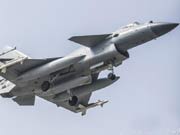 J-10B fighters with homegrown engine in test flight
J-10B fighters with homegrown engine in test flight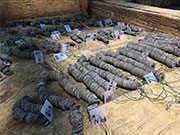 10 tons of copper coins unearthed in 2,000 years old ancient tomb
10 tons of copper coins unearthed in 2,000 years old ancient tomb Beautiful graduate from police college becomes Internet hit
Beautiful graduate from police college becomes Internet hit Photos of U.S. Navy intruding in South China Sea released
Photos of U.S. Navy intruding in South China Sea released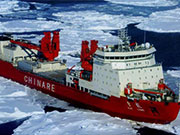 What is inside China's icebreaker ‘Xuelong’?
What is inside China's icebreaker ‘Xuelong’?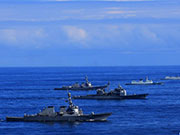 Chinese, U.S. navies hold first-ever joint exercise in the Atlantic
Chinese, U.S. navies hold first-ever joint exercise in the Atlantic In pics: skies of glory
In pics: skies of glory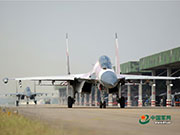 J-10, J-11, Sukhoi Su-30 fighters vs. HQ-9 anti-aircraft missile system
J-10, J-11, Sukhoi Su-30 fighters vs. HQ-9 anti-aircraft missile system Russian plane crash victims sucked out of seats as 'external impact' blew jet apart
Russian plane crash victims sucked out of seats as 'external impact' blew jet apart